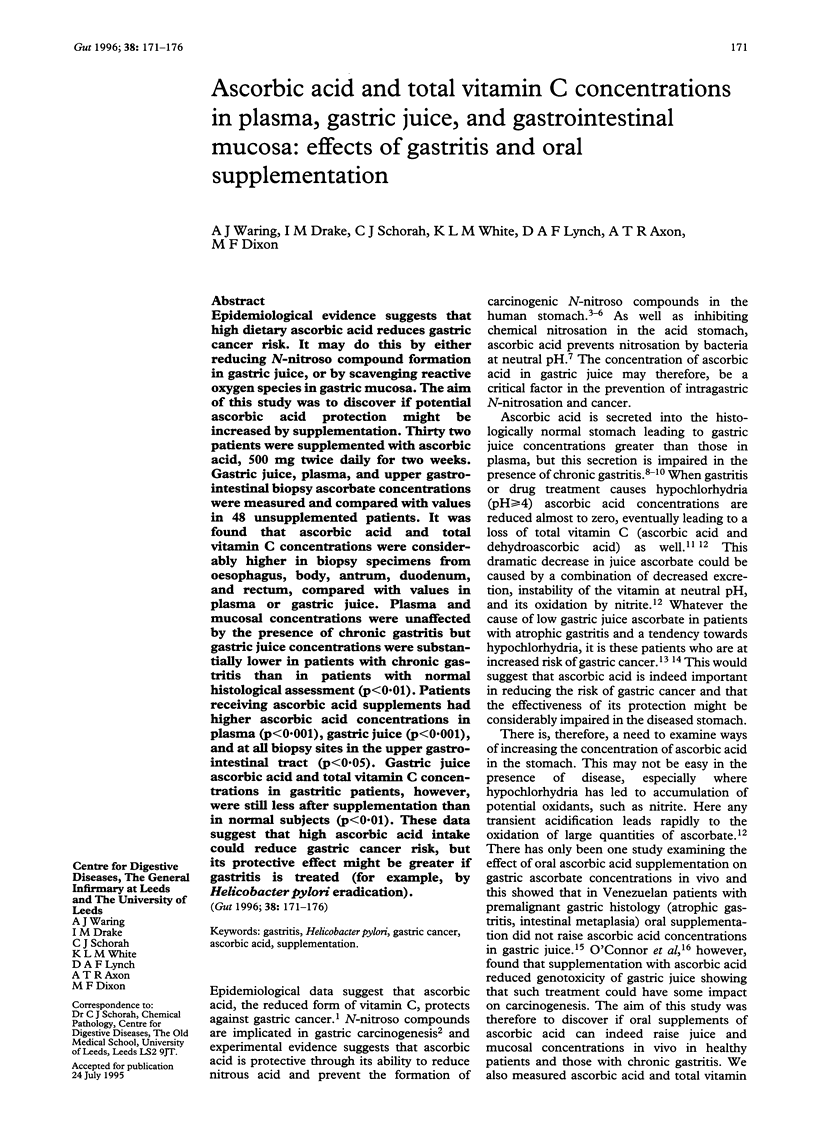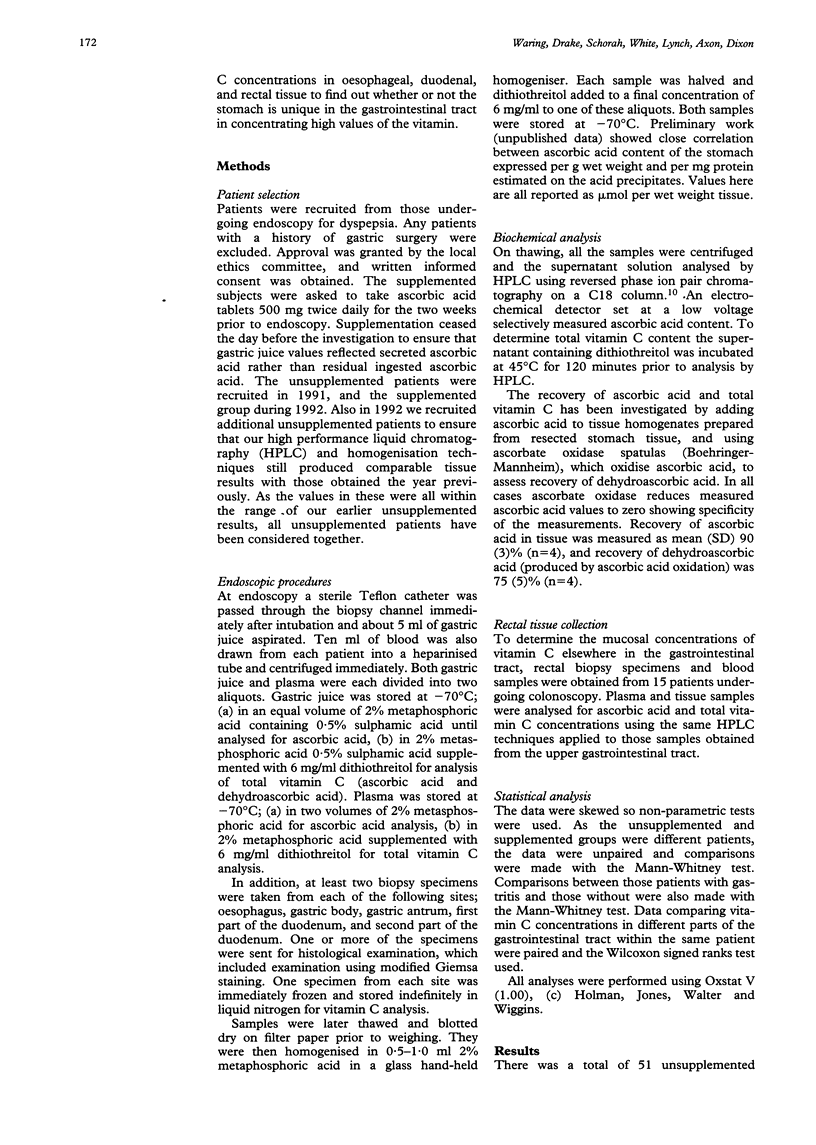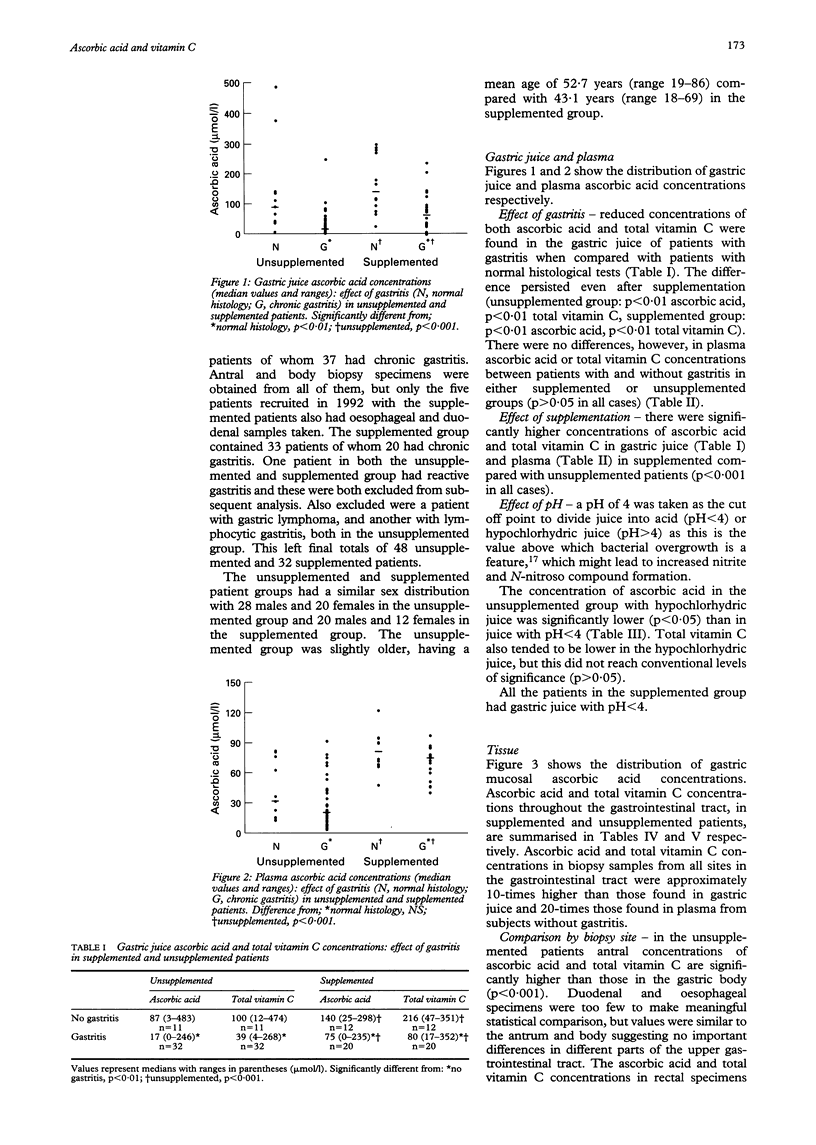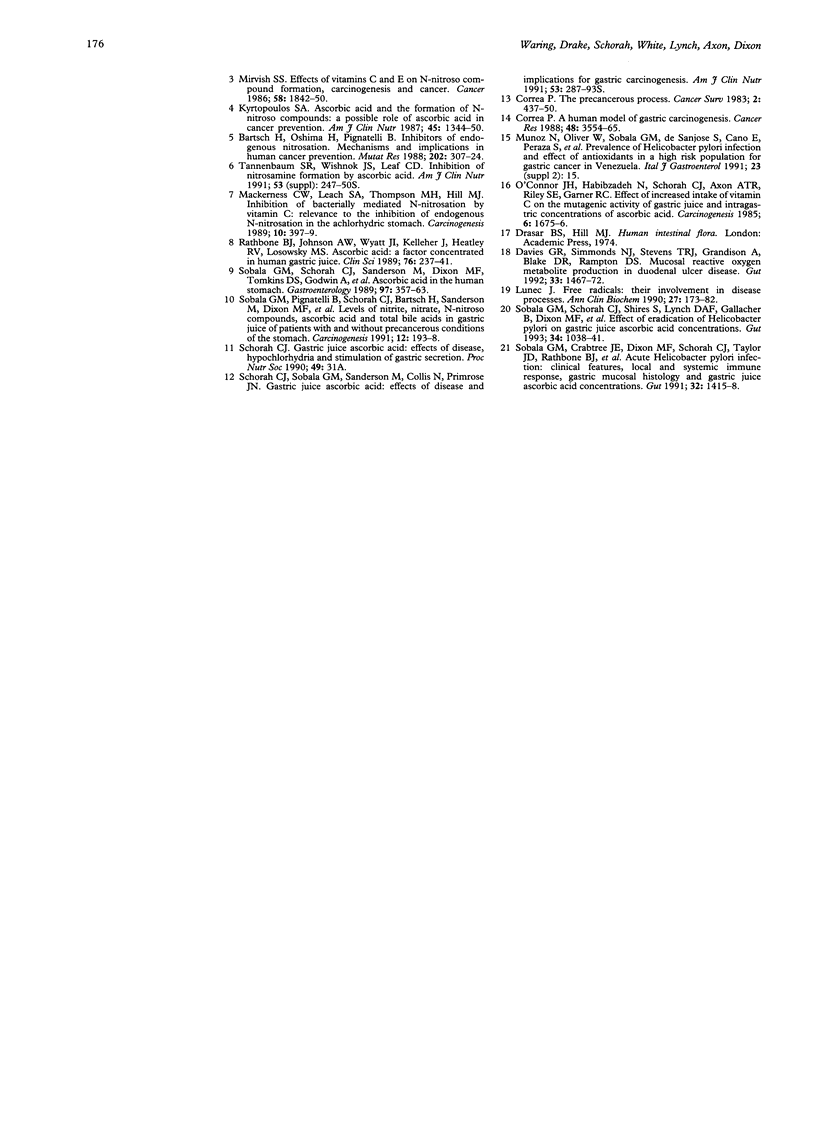Abstract
Epidemiological evidence suggests that high dietary ascorbic acid reduces gastric cancer risk. It may do this by either reducing N-nitroso compound formation in gastric juice, or by scavenging reactive oxygen species in gastric mucosa. The aim of this study was to discover if potential ascorbic acid protection might be increased by supplementation. Thirty two patients were supplemented with ascorbic acid, 500 mg twice daily for two weeks. Gastric juice, plasma, and upper gastrointestinal biopsy ascorbate concentrations were measured and compared with values in 48 unsupplemented patients. It was found that ascorbic acid and total vitamin C concentrations were considerably higher in biopsy specimens from oesophagus, body, antrum, duodenum, and rectum, compared with values in plasma or gastric juice. Plasma and mucosal concentrations were unaffected by the presence of chronic gastritis but gastric juice concentrations were substantially lower in patients with chronic gastritis than in patients with normal histological assessment (p < 0.01). Patients receiving ascorbic acid supplements had higher ascorbic acid concentrations in plasma (p < 0.001), gastric juice (p < 0.001), and at all biopsy sites in the upper gastrointestinal tract (p < 0.05). Gastric juice ascorbic acid and total vitamin C concentrations in gastritic patients, however, were still less after supplementation than in normal subjects (p < 0.01). These data suggest that high ascorbic acid intake could reduce gastric cancer risk, but its protective effect might be greater if gastritis is treated (for example, by Helicobacter pylori eradication).
Full text
PDF





Selected References
These references are in PubMed. This may not be the complete list of references from this article.
- Bartsch H., Ohshima H., Pignatelli B. Inhibitors of endogenous nitrosation. Mechanisms and implications in human cancer prevention. Mutat Res. 1988 Dec;202(2):307–324. doi: 10.1016/0027-5107(88)90194-7. [DOI] [PubMed] [Google Scholar]
- Buiatti E., Palli D., Decarli A., Amadori D., Avellini C., Bianchi S., Bonaguri C., Cipriani F., Cocco P., Giacosa A. A case-control study of gastric cancer and diet in Italy: II. Association with nutrients. Int J Cancer. 1990 May 15;45(5):896–901. doi: 10.1002/ijc.2910450520. [DOI] [PubMed] [Google Scholar]
- Correa P. A human model of gastric carcinogenesis. Cancer Res. 1988 Jul 1;48(13):3554–3560. [PubMed] [Google Scholar]
- Davies G. R., Simmonds N. J., Stevens T. R., Grandison A., Blake D. R., Rampton D. S. Mucosal reactive oxygen metabolite production in duodenal ulcer disease. Gut. 1992 Nov;33(11):1467–1472. doi: 10.1136/gut.33.11.1467. [DOI] [PMC free article] [PubMed] [Google Scholar]
- Johnson I. T. Fibre sources for the food industry. Proc Nutr Soc. 1990 Feb;49(1):31–38. doi: 10.1079/pns19900006. [DOI] [PubMed] [Google Scholar]
- Kyrtopoulos S. A. Ascorbic acid and the formation of N-nitroso compounds: possible role of ascorbic acid in cancer prevention. Am J Clin Nutr. 1987 May;45(5 Suppl):1344–1350. doi: 10.1093/ajcn/45.5.1344. [DOI] [PubMed] [Google Scholar]
- Lancia A., Colella F., Nicolella U., Grandioso P., Di Virgilio D. Hepatic damage after danazol treatment. Ital J Gastroenterol. 1991 Jan;23(1):15–16. [PubMed] [Google Scholar]
- Lunec J. Free radicals: their involvement in disease processes. Ann Clin Biochem. 1990 May;27(Pt 3):173–182. doi: 10.1177/000456329002700301. [DOI] [PubMed] [Google Scholar]
- Mackerness C. W., Leach S. A., Thompson M. H., Hill M. J. The inhibition of bacterially mediated N-nitrosation by vitamin C: relevance to the inhibition of endogenous N-nitrosation in the achlorhydric stomach. Carcinogenesis. 1989 Feb;10(2):397–399. doi: 10.1093/carcin/10.2.397. [DOI] [PubMed] [Google Scholar]
- Mirvish S. S. Effects of vitamins C and E on N-nitroso compound formation, carcinogenesis, and cancer. Cancer. 1986 Oct 15;58(8 Suppl):1842–1850. doi: 10.1002/1097-0142(19861015)58:8+<1842::aid-cncr2820581410>3.0.co;2-#. [DOI] [PubMed] [Google Scholar]
- Mirvish S. S., Wallcave L., Eagen M., Shubik P. Ascorbate-nitrite reaction: possible means of blocking the formation of carcinogenic N-nitroso compounds. Science. 1972 Jul 7;177(4043):65–68. doi: 10.1126/science.177.4043.65. [DOI] [PubMed] [Google Scholar]
- O'Connor H. J., Habibzedah N., Schorah C. J., Axon A. T., Riley S. E., Garner R. C. Effect of increased intake of vitamin C on the mutagenic activity of gastric juice and intragastric concentrations of ascorbic acid. Carcinogenesis. 1985 Nov;6(11):1675–1676. doi: 10.1093/carcin/6.11.1675. [DOI] [PubMed] [Google Scholar]
- Rathbone B. J., Johnson A. W., Wyatt J. I., Kelleher J., Heatley R. V., Losowsky M. S. Ascorbic acid: a factor concentrated in human gastric juice. Clin Sci (Lond) 1989 Mar;76(3):237–241. doi: 10.1042/cs0760237. [DOI] [PubMed] [Google Scholar]
- Sobala G. M., Crabtree J. E., Dixon M. F., Schorah C. J., Taylor J. D., Rathbone B. J., Heatley R. V., Axon A. T. Acute Helicobacter pylori infection: clinical features, local and systemic immune response, gastric mucosal histology, and gastric juice ascorbic acid concentrations. Gut. 1991 Nov;32(11):1415–1418. doi: 10.1136/gut.32.11.1415. [DOI] [PMC free article] [PubMed] [Google Scholar]
- Sobala G. M., Pignatelli B., Schorah C. J., Bartsch H., Sanderson M., Dixon M. F., Shires S., King R. F., Axon A. T. Levels of nitrite, nitrate, N-nitroso compounds, ascorbic acid and total bile acids in gastric juice of patients with and without precancerous conditions of the stomach. Carcinogenesis. 1991 Feb;12(2):193–198. doi: 10.1093/carcin/12.2.193. [DOI] [PubMed] [Google Scholar]
- Sobala G. M., Schorah C. J., Sanderson M., Dixon M. F., Tompkins D. S., Godwin P., Axon A. T. Ascorbic acid in the human stomach. Gastroenterology. 1989 Aug;97(2):357–363. doi: 10.1016/0016-5085(89)90071-1. [DOI] [PubMed] [Google Scholar]
- Sobala G. M., Schorah C. J., Shires S., Lynch D. A., Gallacher B., Dixon M. F., Axon A. T. Effect of eradication of Helicobacter pylori on gastric juice ascorbic acid concentrations. Gut. 1993 Aug;34(8):1038–1041. doi: 10.1136/gut.34.8.1038. [DOI] [PMC free article] [PubMed] [Google Scholar]


